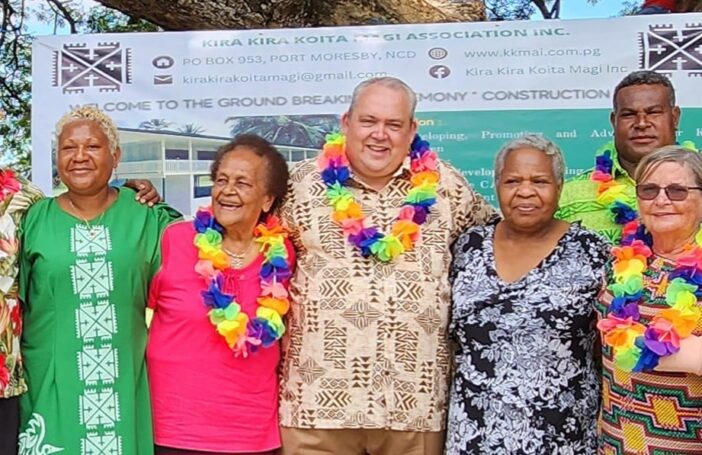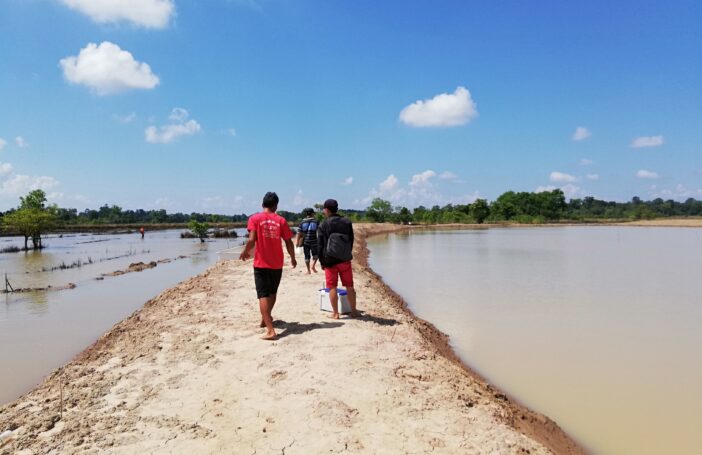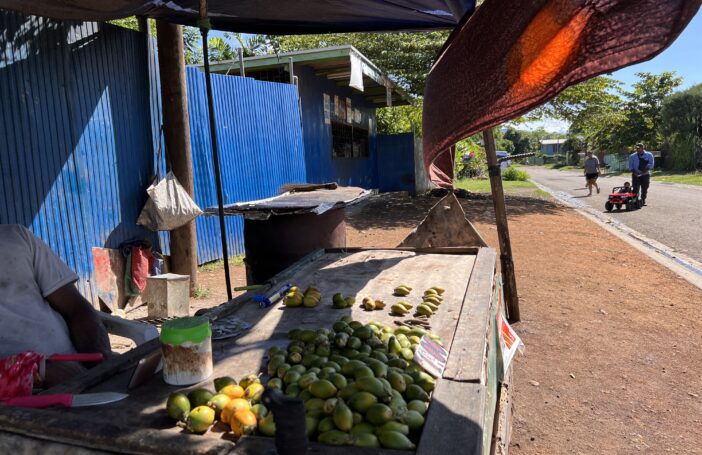In Papua New Guinea it is government policy to encourage growth and development of the informal economy. This may surprise observers aware of how often the ‘informal sector’ is the subject of controversy. After years of effort, a national informal economy policy [pdf] was adopted by the National Executive Council (NEC) in 2011, driven by the then Minister for Community Development, Dame Carol Kidu. She was supported in this by the Consultative Implementation and Monitoring Council (CIMC). Sadly, the policy lost momentum after Dame Carol departed the Ministry and retired from politics. Three changes of Minister and loss of continuity in the senior bureaucracy have contributed to stasis in the meantime.
As Dame Carol found, gaining support for the policy was an uphill task in the face of entrenched antipathy to the ‘informal sector’ among some members of the PNG political class. At both local and national levels there are many examples of this antipathy, which reflects an elite psychology distanced from ordinary people who throng the streets and markets of the towns. It suggests an inferiority complex, a sense of shame that such people are a barrier to ‘modernization’. The epicentre of this disgust is the street trade in buai (betel nut, Areca catechu). While city authorities are entitled to feel that public consumption resulting from the trade is a blight on the appearance of towns [pdf] and a risk to public health, it is also a model domestic industry, in terms of the numbers of people it supports, the income generated, and the efficiency of its logistical system. We can soon expect to see vendors of buai and other commodities cleared from the streets of Port Moresby as part of a clean-up in preparation for the South Pacific Games. What we cannot expect any time soon is a sensible attempt to solve the dilemma — not of the buai trade itself, but of the public consumption of betel nut — while retaining the considerable economic benefits it yields to low-income people.
It is a mark of the immaturity and limited scope of the PNG informal economy that it still lacks a sufficiently diversified set of activities, so that a single informal industry has assumed such notoriety. The national policy adopted by the NEC suggests measures to encourage a more diverse set of ‘informal’ activities, but implementation of these has been slow due to budget constraints. In PNG the informal economy is too small, not too large and is still too limited in scope, scale and contribution to national output. A better functioning and more diverse informal economy is seen as necessary to increase the efficiency of linkages between mineral enclaves and the broader population.
A new Minister for Community Development, Youth and Religion (the Hon. Delilah Gore) and a new Departmental Secretary (Ms Anna Solomon) now give hope that the national policy can gain traction and impress itself on a broader range of government agencies. Certainly the Department seems now to have a renewed sense of ownership and commitment to the policy. It was adopted too late to figure in the Medium Term Development Program 2011-2015 (MTDP) [pdf] but the Department must now seize the opportunity to have the policy’s perspectives on informality reflected in a forthcoming revision of the MTDP. It is now establishing an Informal Economy branch, which will raise the status of the national policy from supported program to integral element of the Ministry. The original trigger for the national informal economy policy was earlier, ground-breaking legislation, the Informal Sector Development and Control Act 2004. This unusual law defined ‘informality’ in the PNG context and provided for the regulation of informal economic activities so as to nurture their growth. The NEC decision adopting the policy called on the Constitutional Law Reform Commission (CLRC) to review this 2004 legislation ‘to align [the legislation] with the National Informal Economic Policy’. Significantly, this was to be done ‘in collaboration with’ the CIMC’s Informal Economy Sectoral Committee.
This review process will likely be completed this year, with a CLRC submission to the NEC. The Informal Economy Sectoral Committee, in the spirit of collaboration called for by NEC, is seeking dialogue with CLRC before the submission is completed. The Committee is concerned that any recommendation for a model law to be adopted by provincial and local governments would create a problem, since the national Department for Community Development lacks decentralized capacity to monitor, coordinate and provide advice on implementation. The Committee also hopes the review will recommend a clear role for the Department itself, whether as implementer and regulator, or simply as coordinator. It is also essential that the revised Act should be comprehended in the new, revised MTDP.
CLRC should draft a law that is implementable, not one as easily ignored as the current Act. With the recent decision by the government to establish District Development Authorities it is important to determine how the informal economy law is going to be implemented. CLRC should identify responsibility for implementation at the provincial, district and local government levels. It is also critical to make the link between the national government and the provincial and local level governments clear in the law, something not done in the current Act. “Pegging” all relevant administering authorities to a national agency will ensure that the Act aligns with the national policy, whose adoption by Government required the law review process in the first place. A separate issue concerns the need for the Act to distinguish informal economic activities clearly from SME (small and medium enterprise) activity, which is currently the subject of separate government attention (focussed in part on the reservation of small business activities for citizens). To avoid inter-agency conflict it is necessary to define ‘informality’ clearly and to emphasize the quite important differences in culture and operations between ‘small’ and ‘micro/informal’ enterprise and their different regulatory needs.
When a new Act is finally in place, aligned with the national policy adopted in 2010, there will be a need for continuous improvements in the policy framework for supporting socially-beneficial informal economic activity. This is an area requiring support from development partners and government. Development partners are beginning to understand the important role of the informal economy, but greater investments are required of them — especially focussing on empowering women, who are the majority of participants. Women must understand their legal rights, while officials responsible for the regulation of informal economic activity must be trained for the role. Periodic surveys of the informal economy, focussing on the scale and scope of activities, and estimates of their economic contribution, will guide such policy improvement. Such surveys should report on supply-side constraints and bottlenecks affecting the productivity and growth of the informal economy and on bureaucratic and other obstacles to transition from ‘micro’ to ‘small’ (or informal to formal) enterprise for those with the potential to make that progression. These efforts would complement the current government emphasis on the SME sector.
Busa Jeremiah Wenogo is an economist working with the Consultative Implementation and Monitoring Council in Port Moresby. John Conroy is a Visiting Research Fellow at the Crawford School, ANU.





….”Shop owners have been told not to engage youths to sell products on the streets…” — John, this recent news article supports some of the things we’ve discussed here.
Thank you Dorothy for making clear some important things that are worth considering.
Thank you Busa and John. One of the attributing factors in the lack of effective implementation of the Informal Sector Act 2004 was the fact that the Act was passed in the absence of a policy document to guide the implementation. Ideally, policy must precede enactment of law. The Act was left in a vacuum, there was no ownership unlike most laws which are usually parked under respective departments for administration purposes. With the National Informal Economy Policy (2011-2015) now in place, the relevant adjustments can be made including clearly defining the role of a government agency at the national level, which is now the Department of Community Development & Religion. In any decision concerning law making or reforming them, practical application of the law is crucial. Informal sector/economy is cross sector – from a political front, Dept of Provincial Govt could be the national agency; from the economic front, Dept of Trade, Commerce and Industry could be that national agency. Whichever agency it is, that agency must have the capacity and resources to administer implementation of the law. Definition of terminologies is also critical to make that distinction between SME and informal businesses.
Other challenges also exist – how does one come up with a comprehensive law that caters for both rural informal economy and urban informal economy; to what extent can provinces legislate on informal economy in their provinces consistent with their law making powers under the Organic Law on PG and LLGs; CLRC’s law reform proposal on the Informal Sector Act can only propose amendments that are practically viable in terms of implementation. But clearly defining the roles of the responsible national agency and the Administering Authorities (LLGs) will definitely alleviate some of the obstacles in terms of implementation and enforcement.
Thank you Busa and John for this article. Some of the issues currently seen from the ‘buai ban’ reiterates the importance (or not) of the informal sector. The chief problem with the Informal Sector Act 2004 appears to be the lack of enforcement. Aligning certain legislation with national policies is critical, but unless an enactment is properly administered and enforced, there’s little to be gained in terms of reform. Perhaps the sensitivity surrounding informal sector economy may have restricted a functioning enforcement mechanism.
Another issue that is often missing in discussions concerning informal sector is the influx of foreign entities engaging covertly in informal economy. Under the Act, the informal sector is reserved for Papua New Guineans. However, what is increasingly happening in the country, especially on the streets, is that people are being used as conduit to sell store items from shops. They call them ‘street-sellers’ and most of them are teenagers, even some are under-aged to be engaged in labour. This ‘street selling’ may have fall under informal sector economy, but authorities failed to realise that it is part of a pervasive and exploitative business venture. Foreign companies that are using these conduit to sell on the streets are exploiting a gap in the informal sector legislation that does not extensively regulate the supplier of goods on informal market. The present reform needs look beyond its narrow scope of policy and institutional orientation to take into account these concerns that borders on human rights, corporate illegality and economic sustainability.
Thank you Bal and Dorothy for your responses. I concur with Dorothy that due to the absence of the policy it really affected the enforcement of the Act. Apart from that as was highlighted in the article we also recognised from the outset (during the review process ably led by Dorothy and her team) that the lack of ownership at the national level has led to stagnation. Now that the Department of Community Development & Religion is the lead implementing agency of the National Informal Economy Policy it is hoped that they also play a leading role in the administration of the amended Informal sector law. How are we going to achieve that while taking into consideration the Organic Law on Provincial & Local Level Government is something that CLRC has been doing its best to develop a way forward. I am sure they are already at the cusp of finding a solution. Aligning the policy with the law has not been easy and I can tell you (as a member of the review working group) CLRC is doing its very best to make the law more effective than the last. We also note that in trying to make the enforcement effective the administering authorities (particularly the provincial and local level government) do have adequate resources to enforce it unlike the currently status quo. This could mean that there could be an increased focus on how the new District Development Authority (DDA) will assist the respective LLGs to enforce this Act. These efforts have to be backed up with alot of civic awareness and training so that these administrators know their roles and responsibilities. However, we also realise that the lack of participation and ownership by the informal economy participants has led to endless conflicts and other problems. Therefore, CIMC through the informal economy sectoral committee is proposing that we organise the informal economy participants into associations/chambers so that they can be able to have a voice. The UNWOMEN/NCDC Safe Cities Market Project provides a great platform for doing this. Furthermore, these voice mechanisms can play a pivotal role in funneling important information (such as the Informal Sector Development & Control Act) to its members so that atleast we accomplish some sense of “order”. We are hoping if that can be factored into the new law or made as one of the major policy recommendations for government’s consideration.
Bal, your concern on child labour is something that I believe CLRC is taking into consideration. There are also other efforts from International Labour Organisation and Department of Labour and Industrial Relations to develop a child labour policy. This will complement the Lukautim Pikinini Act that was recently passed. All in all because of the complexity of the issue the law is not able to cover all areas of concern. Yet there will be recommendations made that would have an impact on the financial sector and other areas as per the policy directives.
Thank you, John, for the article.
I agree with Bal on the concern regarding influx of foreign entities who are using ‘street sellers’.
It is not only that, they themselves are also selling at ‘buai’ stalls as we go further into the provinces. The sad thing is, those in the informal economy do not know their rights. How can we get the message to the ‘everyday’ PNGean, about their rights?